What’s a mortgage default, and how do you avoid it?
By: H.G. Watson on August 18, 2023
The International Monetary Fund recently released a report highlighting countries that are at risk of mortgage default.
Topping the list? Canada.
Canada also has the highest rate of household debt, and three-quarters of household debt comes from mortgages. A combination of high interest rates and household debt makes mortgage payments more expensive than ever, putting Canadians in danger of not being able to afford their very own homes.
In one extreme case, a family in Barrie was forced to sell their home when their mortgage payments increased by more than double: they were on the hook for $6,200 a month. While default rates remain low, delinquencies on credit cards and car loans last year increased by 1.5 and 2%. Most people default on other debt before their house loans, because of course, that’s where they live. But this rise is indictive that mortgage defaults could be next.
However, if your mortgage payments are increasing, or you are trying to pay off other debts, it doesn’t necessarily mean you’ll go into default.
What is a mortgage default?
If you don’t pay your monthly mortgage payment, you would be defaulting – right? Yes, but not the second you fail to make the payment. Most mortgage contracts only consider it a default if you miss a payment after 90 days. “People may miss payments because there was wrong banking information or another cheque [was withdrawn] before,” says Shawn Stillman, the co-founder of Mortgage Outlet. So, missing the exact payment day does not mean the bank can take possession of your home.
You can also go into default if you break stipulations in your mortgage. For instance, not paying property taxes, taking out a second mortgage (if that’s not allowed in your contract), and building an entirely new home on the property without notifying your broker. That’s because your property is insured for a certain value, and all of these actions change the value of your home.
What happens if you default on your mortgage?
First off, the bank is not going to come claim your home without notice. You will first receive reminder notices and calls. If that didn’t work, the bank may send you a “demand letter” for the outstanding balance of the mortgage.
Here you start incurring late fees, and this can add up. In addition to the mortgage installment, you’ll also be on the hook for paying a late fee each month. If you fail to respond to these notices, the bank will take possession of your home and sell it to recoup the money they’re owned on the mortgage.
Some lenders might have mortgage default insurance in place, for situations in which the mortgage holder puts down less than 20% on the home purchase. It protects the lender if the borrower defaults.
Of course, the worst outcome of this is that you would lose your home. Additionally, being approved for any loan in the future may prove challenging – a missed payment affects your credit score and will remain on your credit report for seven years. If you cannot pay the remainder of the mortgage, you might even have to file for bankruptcy.
Thankfully, there’s some time before it comes to that.
How do you avoid defaulting on your mortgage?
"The last thing that lenders want to do is take over the house,” says Stillman. He recommends calling your broker as soon as you have an inkling that you might not be able to make your monthly payment. This can happen to people for many reasons beyond even interest rates. For example, a serious illness or job loss can prevent you from being able to make payments.
Your broker can extend your amortization period (the amount of time you have to pay back your mortgage). Although it will take longer for you to pay back your mortgage, you will be able to lower your monthly payment. If interest rates go down or your financial position changes in the meantime, you can go back and always negotiate your mortgage at a later date.
Depending on how much your mortgage payment increases, some people will choose to simply sell to keep their costs lower. The family from Barrie, for example, found that it was cheaper to rent rather than change their mortgage. That can be one option if cheaper rentals are available, or if you think you’d make enough on the sale to buy a more affordable home.
But Stillman emphasizes that most lenders want people to be able to stay in their homes. “It is much better to be proactive,” he says, reminding people to call their bank or broker.
“Don't put your head in the sand. Communication is key to alleviate the bank taking possession of your house.”
432e.jpg)
b188.jpg)
